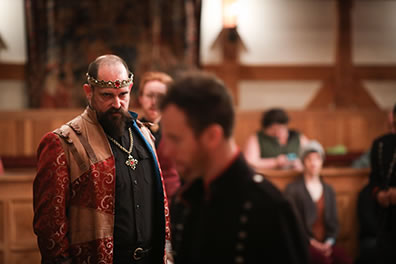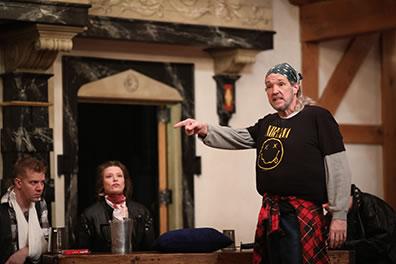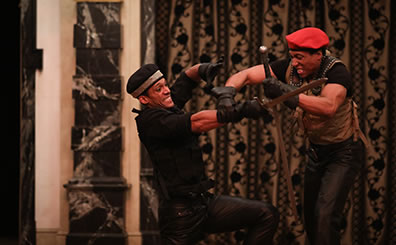Henry IV, Part One
Royalty and Loyalty in the DNA
American Shakespeare Center, Blackfriars Playhouse, Staunton, Virginia
Sunday, February 17, 2019, C–10&11 (middle stalls)
Actors' Renaissance Season

King Henry IV (David Anthony Lewis, left) goes off on Worcester (Chris Johnston, front) as Northumberland (Calder Shilling) watches in the American Shakespeare Center's production of William Shakespeare's Henry IV, Part One, at the Blackfriars Playhouse. Photo by Lindsey Walters, American Shakespare Center.
It starts with a poetry slam. Not William Shakespeare versus Kit Marlowe but Montell Jordan versus Kendrick Lamar. It continues in a post-punk meets hip-hop aesthete, the actors costumed in torn jeans, black leather, and bling, the rebels wearing double-breasted, red-trimmed blue uniform tunics, Hal wearing a t-shirt emblazoned with "Hotspur sucketh" (available for sale in the lobby). Is this what happens when you turn a Shakespeare play over to a dozen actors and tell them to stage it by themselves in five days?
Yes, it is and thank goodness because, collectively and individually, the members of the Actors' Renaissance Season company at the American Shakespeare Center (ASC) have given us a most inventive and insightful Henry IV, Part One, at the Blackfriars Playhouse in Staunton, Virginia. Don't be fooled by the costumes on stage. We are in the world's only re-creation of Shakespeare's indoor theater where the ASC uses the staging practices of Shakespeare's time: universal lighting (we see them, they see us, we see each other), close proximity of audience to actors (stools right on stage), actors directly addressing the audience (you might end up in Falstaff's army), and no electronic or digital effects (all acoustic). It also means the option of using modern music and costumes, as Shakespeare did in his time. In these staging conditions, the company puts all its faith in one thing: Shakespeare's texts, the source for all character motivations and staging decisions.
This is especially key during the Actors' Renaissance Season, or "Ren Season," when the actors mount a repertory using the production practices of Shakespeare's company: only about five days of rehearsal and no director or production team. There's no time for conceptual layering or extratextual matter. Each cast member must forge his or her own character—no director to insist that Hal is really gay or Henry is Trump and Glendower Jim Acosta—and work in collaboration to turn their puzzle into a living piece of art.
This Henry IV, Part One, is one of the most conceptual renderings of a Shakespeare play I've seen on this stage. The show opens with a mashup of Jordan's "This Is How We Do It" and Lamar's "DNA," placing a hip-hop lens on this 16th century play and the medieval struggle for the crown it portrays. Game of Thrones has become the go-to pop culture reference for productions of Shakespeare's history plays; these guys seem to draw their inspiration from Empire. Brandon Carter playing Hal leads the troupe in Jordan's R&B partyer while KP Powell playing Hotspur challenges him through Lamar's intense, aggressive rap. I'm not sure who the guiding force is for this particular company. John Harrell (Falstaff) is credited as actor-manager for text and Chris Johnston (Worcester and others) as actor-manager for music, and in past Ren Seasons, the productions' lead actors took charge of staging the plays; but who is the lead actor for Henry IV? Its Ren Season repertory partner, The Merry Wives of Windsor, uses Elizabethan costumes. (The season's third play, having its world premiere this weekend, is Amy E. Witting's Anne Page Hates Fun; a fourth show, Arden of Faversham, opens in March). Whoever set forth the conceptual look for Henry IV, the end product is an ensemble effort.
Individual and collaborative performances, though, are what yield the many textual discoveries of this production, the most profound being what Carter brings to Prince Hal's journey. Wearing black leather pants and gold-brocaded black vest with a high collar over his Hotspur-dissing t-shirt, the prince is the brooding star. He sneaks in a few vapes and takes a piss at the back of the stage as he declines to participate in the Gads Hill robbery. His relationship with his entourage is more symbiotic leaching than respect: Falstaff and the gang hitch to him for money, protection, and status, Hal uses them as a playground where he can take temporary shelter from responsibility. Poins (Katie Little) has been regendered, wearing torn blue jeans, black Converse High Tops, and a black leather jacket over a black halter top with bare midriff. Carter's Hal has the hots for Poins, a couple of times trying to kiss her, but Little keeps slipping out of his grasp. She has Hal's back and is willing to fight for him (her switchblade comes out when the Sheriff arrives at the tavern, and she hesitates when Hal orders everybody out), but we never see her take the sexual step.
Carter's first major score is his "I know you all" soliloquy. This is one of two infamous conundrum moments for the actor playing Hal as he declares he some day will imitate the sun emerging from the clouds, his "reformation, glittering o'er my fault." The character of this speech could be anything from coy playfulness to outright Machiavellian, the tone anything from wishful thinking to angry assurance. And who is "you all" for whom he "will awhile uphold the unyoked humor of your idleness"? His entourage who just exited? Society writ large? Himself? Carter delivers this soliloquy in the tradition of Richard III and Iago, stepping to the front of the stage and with a sweep of his hands establishes he means "we all." Because Elizabethans knew the Prince Hal story well, Shakespeare lets Hal assure his audience that he's got this, here's what he's really about. Including filmed versions, I've seen this play 20 times, and Carter's is the first performance of this soliloquy that feels absolutely right and not just merely interesting. It also establishes his tone for the play's other great conundrum moment when, in the play-acting scene in Eastcheap, he responds to Falstaff's imploring him not to banish "plump Jack" with a stout, matter-of-fact "I do, I will." Though in structure this soliloquy resembles Richard's "Winter of our discontent," contextually it is more Hamlet. Hal tells us honestly what he plans to do, but he doesn't really know what lies ahead, and he has some growing to do.
Much of that growing comes in the Eastcheap scene. Running more than 400 lines, Act II, Scene 4, features a sequence of Hal-centered episodes. He hangs out with the tapsters. He plays a stupid prank on Francis the drawer. He makes fun of Hotspur. He and Poins trap Falstaff in his lies about what happened during the robbery at Gads Hill ("I tell thee what, Hal, if I tell thee a lie, spit in my face," Falstaff says, and Carter looks knowingly to the audience with a you-heard-him expression). He and Falstaff act out the upcoming meeting of Hal with his father. He dismisses the sheriff looking for Falstaff. He has the sleeping Falstaff's pocket picked. Productions generally cut some or all of the episodes leading up to Falstaff's arrival, and this one cuts Francis. What it keeps is more important, Hal's mimicking of Hotspur: "I am not yet of Percy's mind, the Hotspur of the north; he that kills me some six or seven dozen of Scots at a breakfast, washes his hands, and says to his wife 'Fie upon this quiet life! I want work.'" It's a funny satire of the Hotspur we've seen (even as Powell's Hotspur channels Kanye West), but it also reverberates most pointedly later in the play.
Hal, though, gets his first jolt of self-realization later in this scene. In their "play extempore," after Falstaff first plays the father and Hal himself, they switch roles and Hal as Henry starts grilling Falstaff as Hal about "that old white-bearded Satan," meaning Falstaff. "My lord, the man I know," Falstaff's Hal says, and Carter's Hal turns instantly royal, cutting off Falstaff with a roaring "I know thou dost." "But to say I know more harm in him than in myself, were to say more than I know," Falstaff replies. As Harrell's Falstaff is mimicking Hal, Carter's expression portrays Hal seeing himself in what Falstaff just said and realizing he will have to banish his current self as well as his companions.
The real meeting between Hal and Henry (David Anthony Lewis) joins a long line of great Ren Season collaborations I've seen over the years: Benjamin Curns' Richard and Sarah Fallon's Margaret in Richard III, Fallon's Cassius and René Thornton Jr.'s Brutus in Julius Caesar, Lauren Ballard's Miranda and Chad Bradford's Ferdinand in The Tempest, Allison Glenzer's Isabella and Jonathan Holtzman's Angelo in Measure for Measure, Thornton's Martius and Glenzer's Volumnia in Coriolanus, and Fallon's Evadne castrating Holtzman's King in The Maid's Tragedy. And it's all textual.
With Hal already onstage, Lewis's Henry comes through the door, sees Hal, and takes off his crown. He hands it to someone offstage and orders time alone with the Prince of Wales. Henry often is dismissed as the ultimate politician—even within this play—but the king's issue now is how much his son reminds him of Richard II, whom Henry deposed. Hal, self-assured in his emerging-from-the-clouds plan, is the one using political doubletalk as he blows off his dad, suggesting he "Find pardon on my true submission." "Heaven pardon thee!" Henry replies, and Lewis uses the same royal roar Hal had used on Falstaff. Henry ends the subsequent 60-line tirade with "Not an eye but is a-weary of thy common sight, save mine, which hath desired to see thee more," upon which, Lewis rushes across the stage and aggressively embraces his son. Lewis makes this feel in-the-moment genuine, and Hal is taken aback. "I shall hereafter, my thrice gracious lord, be more myself," Hal says.
Uh-oh: Hal's vision of "myself" is not his father's, for Henry's very next line is "For all the world as thou art to this hour was Richard then when I from France set foot at Ravensburgh." Henry doesn't want his son to be "more like himself," he wants him to be more like Hotspur: "And even as I was then is Percy now." Hal's making fun of Hotspur now comes back to haunt him as he hears how his counterpart "being no more in debt to years than thou, leads ancient lords and reverend bishops on to bloody battles and to bruising arms." The flow from Hal's "I know you" soliloquy through mimicking Hotspur makes its turn here. Hal knows us and knows himself, but he doesn't know the world, and his ploy to emerge like the sun is great theatrics but meaningless if nobody follows you from behind your cloud—except it be Falstaff (likely, right?).
Upon his father calling him "degenerate," Hal unleashes his urgent remonstrance, on his knee and with high terms of chivalry and honor, ending with "I will die a hundred thousand deaths, Ere break the smallest parcel of this vow." Hal comes off as serious. Lewis then delivers Henry's response in a way I've never seen before. "A hundred thousand rebels die in this," he says in the manner of a coach, stabbing his finger on "this": This is how you act; this is how you will lead. Lewis's approach to the Henry-Hal meeting forecasts their ultimate relationship in Part Two. For Hal, it's another moment of realization, and he nods. "Thou shalt have charge and sovereign trust herein," Henry says. The son has emerged.
The Hal we see henceforth is the Hal that Vernon (Meg Rodgers) a couple of scenes later describes to Hotspur, who, ironically, has just made fun of the Prince of Wales. He doesn't learn the lesson, and the play's thematic arc shifts to him. I've always preferred comic readings of Hotspur, but Powell's hyper-ego take on Harry Percy fits this production's thematic arc better. Powell's foundational moment for his Hotspur comes in his first scene when his hotheaded rants earn him admonishment from his father, Northumberland (Shilling), and his uncle Worcester (Johnston). "Why, look you, I am whipp'd and scourged with rods, nettled and stung with pismires, when I hear of this vile politician, Bolingbroke," Hotspur replies, and Powell physically convulses as he speaks the line. Even the slightest slight wounds him deeply.
This nature of his does lasting damage in the rebels' war council, during which Hotspur, Glendower (Shilling), and Mortimer (Katie Little) pore over the map dividing England into three territories. You can go comical or serious with this scene, and this production walks a tightrope through both, the lines funny, but the scene seriously tense. When Hotspur declares he will change the River Trent's course to give him a section of fertile land otherwise denied him, Little plays Mortimer as more than a little peeved, as Hotspur's plan would deprive him of that land. It is Glendower, though, who insists that the Trent shall not be altered, and as he stiffens his demand, Powell's face becomes a ballistic warhead just ahead of Hotspur launching to his feet to throw down with Glendower. Afterward, Worcester lectures Hotspur that "haunting a nobleman loseth men's hearts." "Well, I am school'd: good manners by your speed!" Hotspur replies dismissively. Note that two of the three parties in this scene don't arrive in Shrewsbury as promised, and Shilling's body language indicates Glendower has just come to that conclusion.
Shakespeare places this scene between the Eastcheap play-extempore meeting between Henry and Hal and the real meeting between Henry and Hal, and this production makes the juxtaposition of these three scenes thematically taut.


Top, Falstaff (John Harrell) gives his version of events on Gads Hill as Gadshill (Benjamin Reed) and Peto (Meg Rodgers) sport fake wounds in Shakespeare's Henry IV, Part One, at the Blackfriars Playhouse. Above, Prince Hal (Brandon Carter, left) fights with Hotspur (KP Powell) at Shrewsbury. Photos by Lindsey Walters, American Shakespeare Center.
This thematic yarn winds into the Hotspur-Hal fight at Shrewsbury, the final lesson for Hotspur in separating his world from the real world. In a swift-moving fight of feints and attacks from various angles choreographed by Benjamin Reed (who also plays Gadshill and Douglas), Hotspur shows himself the epitome of arrogant honor. When he has wounded Hal, disarming him of his sword, Powell's Hotspur goes through the motions of ritualized killing as Hal pulls a dagger from the back of his belt and stabs up into the lunging Percy. Hotspur is incredulous he could be killed, especially by this "madcap Prince of Wales." Hal, ready to move on, slits Hotspur's throat and finishes Percy's sentence for him as the rebel falls, shuddering on the ground. Then seeing the dead Falstaff at the back of the stage, Hal takes out a flask, bathes his own wounded eye with the alcohol, and then pours one for his homie, dribbling some liquor on the ground.
Too early, of course. Falstaff is counterfeiting, having used the Oak Leaf Box Wine he's been carrying with him in the battle, to block Douglas's knife (that makes Falstaff's life worth about $11.46).
Three actors play their characters in both Henry IV and Merry Wives: Shilling as Bardolph, Rick Blunt as Quickly, and Harrell as Falstaff. Shilling and Blunt don't alter their characters from play to play, but Harrell gives two completely different Falstaffs: a bombastically self-righteous scoundrel in a cartoonish fat suit for Merry Wives, and an aging, potbellied metalhead wearing a Nirvana smiley face t-shirt in Henry IV, his long, gray hair tied up in a bandana and a red checkered shirt tied around his waist. In this play, Harrell's Falstaff clings to his countercultural past and thinks Hal is a willing acolyte—just the musical styles differ. Though we don't feel much love between the two, Carter and Harrell have great stage rapport, but Harrell most shines in Falstaff's great soliloquies, especially his catechism on honor, the perpetual drunk waxing forth on his philosophical meanderings and tales of putting one over on the government.
Critics and actors have long considered Falstaff to be two different characters in the two plays, albeit sharing the same physical dimensions and easy-financial-gain motivations. Some might bemoan the lost opportunity to watch a Falstaffian throughline for these two plays. However, approaching the two plays from totally different perspectives—the bolder move for a Ren Season troupe under so much pressure just trying to mount each play—is the more interesting way to go. It's the better choice, too: Merry Wives tends to play best in Elizabethan costumes as it is the only play Shakespeare set in his own time; Henry IV is a play for all times.
Eric Minton
February 23, 2019
Comment: e-mail [email protected]
Start a discussion in the Bardroom



 Find additional Shakespeareances
Find additional Shakespeareances